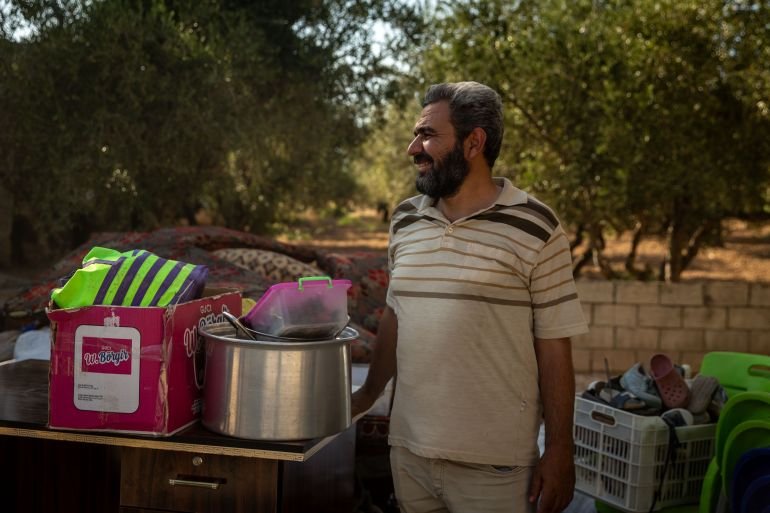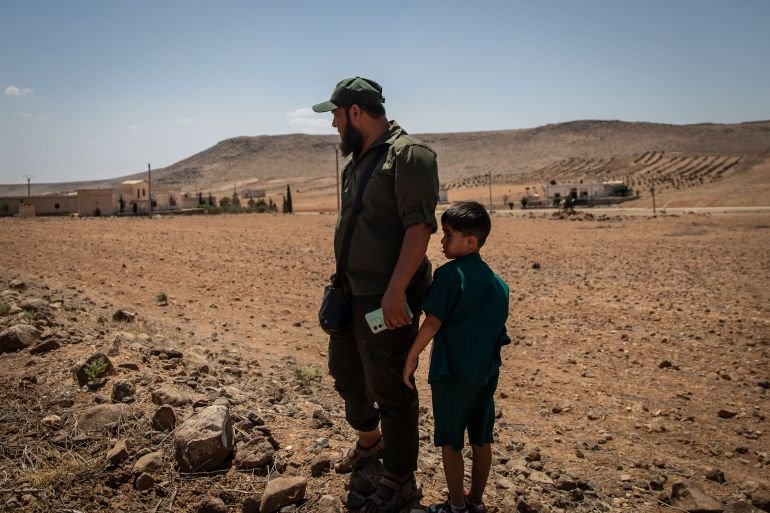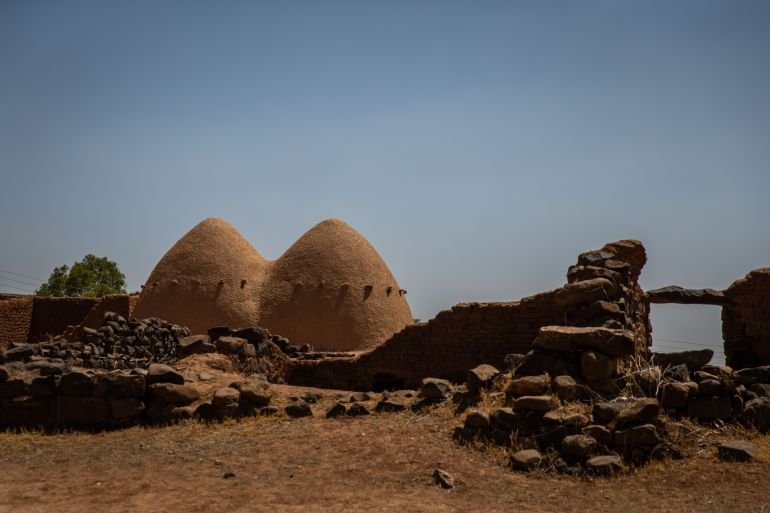Syrians – both refugees and internally displaced – are returning home in increasing numbers since the fall of al-Assad.
Tremseh, Jubb Alis and Homs, Syria – Tremseh was celebrating. The streets of the small town north of Hama were packed.
Despite the blazing sun and sweltering heat, all the residents had come out of their homes to witness a historic moment, the return of hundreds of exiled sons and daughters of the town.
A convoy of colourful trucks carrying entire families was driving through the streets, packed to the brim with belongings – mattresses, furniture and even motorbikes and trees.
Some passers-by filmed with their cellphones. Others beamed with joy. A crowd danced to a “zaffeh”, a traditional dance and music band usually popular during weddings, while some men fired long salvoes of celebratory gunshots into the air.
Several months earlier, in December, the regime of President Bashar al-Assad had been overthrown, ending a 14-year civil war.
That allowed the more than 180 returning families, who had spent more than a decade in exile, to come back to their homes and their roots in Tremseh.
A few hours earlier, they had left the Atmeh camp on the outskirts of Idlib, one of the largest displacement camps in the country, 150km (93 miles) north of Tremseh, where more than 80,000 people had been living in unsanitary and miserable conditions.
“When we were expelled, it felt as if our souls had been torn from our bodies. Now that we have returned, it feels as if we have regained our souls,” Mamdouh al-Sattouf, a 50-year-old former school principal, told media.
Like the majority of Tremseh’s population, he left after the events of July 12, 2012. That day, Syrian government forces surrounded the town and killed dozens of opposition fighters and civilians. Most survivors left in the following months.
Since al-Assad’s fall on December 8 and the end of a 50-year period during which the al-Assad family ruled Syria, convoys like this one have been increasingly frequent. According to the Office of the United Nations High Commissioner for Refugees, of the 14 million people who had fled their homes in Syria, more than 2 million have returned – including 1.5 million internally displaced and 600,000 refugees from abroad.
“In the camp, we always told our children that Tremseh is paradise on earth. Now they can see it for themselves,” Mamdouh said.

Returning after exile
About 130km (80 miles) northeast of Tremseh, Azzam Freij was also finally feeling alive again.
The 34-year-old Syrian had returned from Lebanon to Syria only 10 days after the fall of the al-Assad regime. Since then, he has been living near Homs, where his wife was from. But he was now finally back visiting the place he grew up, Jubb Alis, a farming village an hour south of Aleppo where he had been born and raised.
Living here is not feasible for Azzam. Jubb Alis is small, and there is little work here. But he’s still eager to use his newfound freedom to visit a place he has fond memories of.
Seven-year-old Kheiro sat on his father’s lap in the passenger seat as they drove to the village and could hardly wait to arrive. “That’s our home!” he exclaimed, pointing to a cluster of traditional mud houses.
It was not Kheiro’s first visit to the place his father had grown up under the clay domes that tower over the other single-storey buildings. Azzam had brought Kheiro along once before.

The scattered homes are surrounded by barren hills, which had been green just a few years earlier.
“Everyone in the village worked in agriculture. But after years of war and with no one to care for them, the trees died,” Azzam explained while climbing out of the car.
The trees had been abandoned and plundered for 14 years, just like Syria – and Azzam wants to breathe new life into them, as he does into his rediscovered country. But like millions of other returning refugees, he has been faced with a parched landscape and an expanse of destruction.
Thanks to a well in the garden, however, Azzam has been able to water the trees since he came back to Syria. Some of them were already looking better, and pomegranates were even growing under the blazing sun.
It may not be Azzam’s first visit back since his return to Syria, but he is still excited every time he walks through the gate of his childhood home. Kheiro was already running and climbing onto the domes of the mud house. “It’s not dangerous. I played the same games when I was little!” Azzam laughed, his eyes full of joy.

The thick walls made of terracotta – an 11,000-year-old traditional homebuilding technique threatened with extinction – provide an astonishing freshness inside. It is one of many such houses in the region although newer homes are built with more modern materials. Azzam sat down next to the small open window to cool off in the breeze.
Azzam’s home had been plundered by the former regime’s troops and militias like all the others in the village. “They left behind only a chandelier and an 80-year-old mirror,” the father said as he walked through the rooms.
“Thank God they left the Quran,” Kheiro added in a serious voice, making the adults laugh.
Azzam estimated that 50 families have returned to Jubb Alis and said this number was still rising despite the hardships awaiting them. All kinds of basic infrastructure are lacking, from water to electricity.
Apart from the walls, nothing else remains in the village.
Difficulties in Lebanon
Azzam had fled Syria in 2012 because he was wanted by the army and secret service for his antigovernment comments on social media. Like most of his family, he then settled in the northern Lebanese city of Tripoli.
He took on several jobs, selling coffee and working as an electrician at the same time. He married Rasha, a Syrian woman from Homs whom he met on Facebook. She moved to Tripoli to be with him shortly afterwards.
Their life there was anything but easy or pleasant.
“In Lebanon, it was an existence full of fear and racism,” Rasha told media in an interview over a cup of tea in their cosy living room in Homs, where the couple settled in December.
About 1.5 million Syrian refugees are estimated to live in Lebanon. Their presence has led to growing resentment from many Lebanese, compounded by government crackdowns against them.
They also have faced economic pressures in a country that is going through an economic crisis – with few job opportunities.
When the al-Assad regime fell, Azzam and Rasha did not wait a second: They returned to Syria as quickly as possible with their two sons, Kheiro and Adam, aged three.
“When they [opposition fighters] reached Damascus, I was over the moon! In less than a week, I had visited Syria, and I said to myself, ‘It’s over! Lebanon is behind me,’” Azzam said with a big smile.
“It was easier because I come from [Syria], and my whole family is still here. We are happy here, thank God,” Rasha explained.
Rasha still returns to Tripoli occasionally to visit her relatives. Azzam refuses to go, saying he’s fine in Homs. Although he hasn’t been able to find a job in Syria, for Azzam, life in Lebanon was miserable, and he now feels free, finally able to “be someone, not just a refugee”.
As media followed him through Homs’s ancient souks, his newfound sense of pride was visible as he greeted old friends, many of whom had also lived in Tripoli. They exchanged small talk, and he examined their newly opened shops.
Syria’s future
In Homs – like in most Syrian cities – many buildings are left in ruins, work is hard to find and lack of security remains a problem. This scares many refugees from coming back.
Azzam is one of the few members of his family who have returned to Syria. His brother, Mohamed Freij, who is nicknamed “Hamoudi”, is still in Tripoli, where he met with media.
The 20-year-old lives with his father, stepmother and cousins in the heart of the Ottoman souks of the old town below the Crusader fortress.
Like many others, he can hardly wait to return to his country. But he is waiting a little longer before leaving.
“Maybe I’ll go to Syria in two years. The country is still in the early stages of development and rebuilding its infrastructure because al-Assad threw us back into the 15th century and we have to start all over again,” the young man said as he sipped coffee under the ivy and trees of the popular Tell al-Olya cafe.
“I want to settle in a city, not in the countryside, which has been neglected by the regime and where life is still very difficult. My friends who have moved to the city are happy,” he explained.
Mohamed prefers to wait until Syria is rebuilt and the economy is more stable. At the moment, the Syrian population is still struggling with much of the country’s infrastructure destroyed or damaged, only two or three hours of electricity per day and water shortages, especially in rural areas.
More than 90 percent of Syrians live below the poverty line, and jobs are difficult to find, so the country still needs time to absorb new workers.
There, he would be able to study political science and computer science but also welcome foreign tourists to the guesthouse he dreams of opening.
Even though Mohamed is looking forward to eventually returning home, he has loved his life in Lebanon. “Tripoli is definitely a part of me. It welcomed me during the war. I will never forget that. I’ve spent half my life here. You can only love a country that has taken you in,” he explained with serenity. Unlike Azzam, he said he had never experienced racism in everyday life in Lebanon.
Before the end of the war, Mohamed had seen his future abroad, like another one of his brothers, who had gotten married and emigrated to England. “But now I only see Syria. It’s my country. I will always return there,” he said with a determination of a whole generation intent on reclaiming its future.
